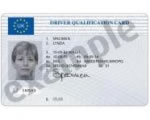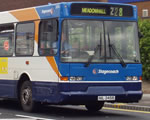 Go to main content
Go to main content
Archive Website of the UK government
Please note that this website has a UK government accesskeys system.
Main menu
Page menu
Motoring

Driver CPC: how to get and keep it

If you are a professional bus, coach or lorry driver you must have a Driver Certificate of Professional Competence (Driver CPC). Find out how to get your Driver CPC if you are new to driving professionally and what rules apply if you are an existing driver.
The Driver CPC qualification
Driver CPC is a qualification for professional bus, coach and lorry drivers. It will:
- improve your knowledge and skills before you start driving
- develop your knowledge and skills throughout your working life
- improve road safety through better qualified drivers
If you are new to professional driving

Watch videos about the initial qualifying tests
If you are a new driver, you must pass an initial Driver CPC qualification before you can drive professionally.
The initial Driver CPC qualification is split into four parts:
- part one - theory test (multiple-choice and hazard perception)
- part two - case studies
- part three - practical test of driving ability
- part four - vehicle safety demonstration
You must pass all four parts to be able to drive professionally.
How to book your Driver CPC initial qualification tests
The quickest and easiest way to book your initial qualification tests is online. However, you can book by phone or post if you prefer.
More about what Driver CPC initial qualification tests involve
By visiting the Business Link website you can find out more about:
- whether you need to take the initial qualification tests
- what happens in the initial qualification tests
- what happens after you have passed the initial qualification tests
Taking periodic training to keep your Driver CPC
 Keep your Driver CPC
Keep your Driver CPC
You must do 35 hours of periodic training every five years to keep your Driver CPC
Periodic training involves attending courses on various aspects of professional driving. You must do 35 hours of periodic training every five years to keep your Driver CPC.
Only approved courses taken with approved training centres will count towards periodic training.
If you drive both lorries and buses professionally
You only need to complete one set of training every five years if you have a passenger carrying vehicle and a large goods vehicle licence.
If you have Driver CPC by 'acquired rights'
If you are an existing professional driver, you will have gained valuable experience in your work. You will have 'acquired rights' for five years, meaning that you will be deemed to have Driver CPC. This applies to you if you are a:
- bus or coach driver and got your vocational licence (D, D1, D+E and D1+E) before 10 September 2023
- lorry driver and got your vocational licence (C, C1, C+E and C1+E) before 10 September 2023
If you have 'acquired rights' you don’t need to pass the initial qualification. However, you must complete 35 hours of periodic training to keep your Driver CPC.
Proof of your Driver CPC: the Driver Qualification Card (DQC)

An example of a DQC
After you have passed the initial qualification you'll get a Driver Qualification Card (DQC).
It's unlawful to drive professionally without having your DQC.
Driver CPC is enforced in all European Union (EU) member states.
If you are driving professionally in another EU country, you must still have a valid Driver CPC.
When Driver CPC is not needed
Non-commercial driving
You don't need Driver CPC if you are driving a vehicle for non-commerical carriage of passengers or goods for personal use
You might not need Driver CPC. Whether you need it or not will depend on:
- the vehicle you drive
- what the vehicle is being used for
Vehicles you can drive where you don't need Driver CPC
You won't need Driver CPC if the vehicle you drive is:
- being road tested after repair, maintenance or technical development
- new or rebuilt and hasn't yet been put into service
- limited to a top speed of no more than 28 miles per hour (45 kilometres per hour)
Vehicle uses where you don't need Driver CPC
You won't need Driver CPC if the vehicle you drive is:
- used for non-commercial carriage of passengers or goods for personal use
- used to carry material or equipment that you use for your job - but driving the vehicle can't be the main part of your job
- used for driving lessons for anyone who wants to get a driving licence or a Driver CPC
- used by, or is under the control of, the armed forces, civil defence, the fire service and forces responsible for maintaining public order
- used in states of emergency or for rescue missions
More useful links
In this section...
- Driver CPC: when and how to take periodic training
- Driver CPC: your Driver Qualification Card (DQC)
- Your driving conduct for larger vehicles, minibuses or buses
- Becoming a lorry or bus driver
- Rules for supervising small lorry and minibus learner drivers
- How to add higher categories to your driving licence (staging and upgrading)


 Facebook
Facebook Twitter
Twitter StumbleUpon
StumbleUpon Delicious
Delicious Reddit
Reddit
